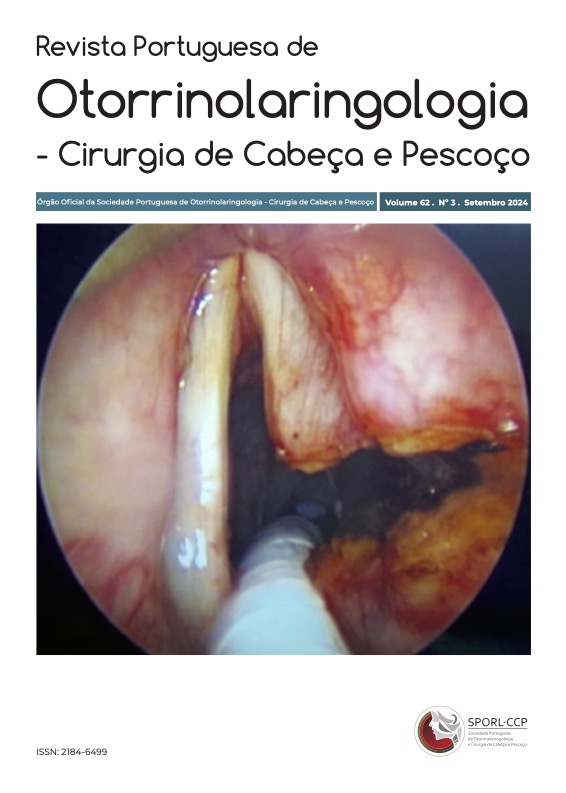Perceção da aplicação de Inteligência Artificial na Otorrinolaringologia Portuguesa
DOI:
https://doi.org/10.34631/sporl.2173Palavras-chave:
Inteligência Artificial, otorrinolaringologia, perceção dos doentes, profissionais de saúde, privacidadeResumo
Introdução - As tecnologias de Inteligência Artificial (IA) têm sido capazes de analisar bases de dados de grandes dimensões e posteriormente aplicar esse conhecimento na resolução de problemas clínicos práticos.
Objetivos - Comparar a perceção da aplicação de AI na Otorrinolaringologia, em Portugal, entre a população geral e os profissionais de saúde.
Material e Métodos - Foi realizado um estudo transversal com recurso a um questionário on-line anónimo e de auto-preenchimento. O questionário analisou aspetos relacionados com as áreas de aplicação da IA, nomeadamente diagnóstico, tomada de decisão clínica, procedimentos cirúrgicos e monitorização de doenças crónicas. Dos 770 participantes adultos (idade igual ou superior a 18 anos), foram excluídos 249 por apresentarem questionários com informações incompletas, sendo selecionados um total de 521.
Resultados - Dos participantes, 60.8% eram do sexo feminino (60,8%), 66.8% tinham entre 26 e 57 anos e 46.4% eram profissionais de saúde. As mulheres preferiram mais frequentemente um ser humano a realizar a monitorização de doenças crónicas (p = 0.024) e cirurgia com baixo risco de vida (p = 0.003). Os elementos de grupos etários mais jovens (18-25 anos) e mais velhos (>67 anos) preferiram humanos a realizarem a avaliação clínica de sinais e sintomas (p = 0.000), a tomada de decisão terapêutica (p = 0.011) e a criação de planos de reabilitação (p = 0.009). Os profissionais de saúde preferiram mais frequentemente humanos a realizar o seguimento de um tratamento (p = 0.000) ou cirurgias com risco de vida (p = 0.004), em comparação com a população geral.
Conclusões - Este estudo sugere que existem diferenças significativas na percepção da aplicação de IA, dependendo do sexo, da idade e da população em geral versus profissionais de saúde.
Downloads
Referências
Aggarwal R, Farag S, Martin G, Ashrafian H, Darzi A. Patient perceptions on data sharing and applying artificial intelligence to health care data: cross-sectional survey. J Med Internet Res. 2021 Aug 26;23(8):e26162. doi: 10.2196/26162.
Lai MC, Brian M, Mamzer MF. Perceptions of artificial intelligence in healthcare: findings from a qualitative survey study among actors in France. J Transl Med. 2020 Jan 9;18(1):14. doi: 10.1186/s12967-019-02204-y.
Esteva A, Kuprel B, Novoa RA, Ko J, Swetter SM, Blau HM. et al. Dermatologist-level classification of skin cancer with deep neural networks. Nature. 2017 Feb 2;542(7639):115-118. doi: 10.1038/nature21056.
Haenssle HA, Fink C, Schneiderbauer R, Toberer F, Buhl T, Blum A. et al. Man against machine: diagnostic performance of a deep learning convolutional neural network for dermoscopic melanoma recognition in comparison to 58 dermatologists. Ann Oncol. 2018 Aug 1;29(8):1836-1842. doi: 10.1093/annonc/mdy166.
Price WN 2nd, Cohen IG. Privacy in the age of medical big data. Nat Med. 2019 Jan;25(1):37-43. doi: 10.1038/s41591-018-0272-7
Martinez-Martin N, Insel TR, Dagum P, Greely HT, Cho MK. Data mining for health: staking out the ethical territory of digital phenotyping. NPJ Digit Med. 2018:1:68. doi: 10.1038/s41746-018-0075-8.
Ongena YP, Haan M, Yakar D, Kwee TC. Patients' views on the implementation of artificial intelligence in radiology: development and validation of a standardized questionnaire. Eur Radiol. 2020 Feb;30(2):1033-1040. doi: 10.1007/s00330-019-06486-0.
Stai B, Heller N, McSweeney S, Rickman J, Blake P, Vasdev R. et al. Public perceptions of artificial intelligence and robotics in medicine. J Endourol. 2020 Oct;34(10):1041-1048. doi: 10.1089/end.2020.0137.
Oh S, Kim JH, Choi SW, Lee HJ, Hong J, Kwon SH. Physician confidence In artificial intelligence: an online mobile survey. J Med Internet Res. 2019 Mar 25;21(3):e12422. doi: 10.2196/12422.
Castagno S, Khalifa M. Perceptions of artificial intelligence among healthcare staff: a qualitative survey study. Front Artif Intell. 2020 Oct 21:3:578983. doi: 10.3389/frai.2020.578983.
Abdullah R, Fakieh B. Health care employees’ perceptions of the use of artificial intelligence applications: survey study. J Med Internet Res. 2020 May 14;22(5):e17620. doi: 10.2196/17620.
Wu Q, Wang X, Liang G, Luo X, Zhou M, Deng H. et al. Advances in image-based artificial intelligence in otorhinolaryngology-head and neck surgery: a systematic review. Otolaryngol Head Neck Surg. 2023 Nov;169(5):1132-1142. doi: 10.1002/ohn.391.
Powell ME, Rodriguez Cancio M, Young D, Nock W, Abdelmessih B, Zeller A. et al. Decoding phonation with artificial intelligence (DeP AI): proof of concept. Laryngoscope Investig Otolaryngol. 2019 Mar 25;4(3):328-334. doi: 10.1002/lio2.259.
Tama BA, Kim DH, Kim G, Kim SW, Lee S. Recent advances in the application of artificial intelligence in otorhinolaryngology-head and neck surgery. Clin Exp Otorhinolaryngol. 2020 Nov;13(4):326-339. doi: 10.21053/ceo.2020.00654.
Fast E, Horvitz E. Long-term trends in the public perception of artificial intelligence. AAAI [Internet]. 2017 Feb.12 [cited 2023 Aug.3];31(1). Available from: https://ojs.aaai.org/index.php/AAAI/article/view/10635
Parker PA, Alba F, Fellman B, Urbauer DL, Li Y, Karam JÁ. et al. Illness uncertainty and quality of life of patients with small renal tumors undergoing watchful waiting: a 2-year prospective study. Eur Urol. 2013 Jun;63(6):1122-7. doi: 10.1016/j.eururo.2013.01.034.
SFR-IA Group; CERF; French Radiology Community. Artificial intelligence and medical imaging 2018: French Radiology Community White Paper. Diagn Interv Imaging. 2018 Nov;99(11):727-742. doi: 10.1016/j.diii.2018.10.003.
Thrall JH, Li X, Li Q, Cruz C, Do S, Dreyer K. et al. Artificial intelligence and machine learning In radiology: opportunities, challenges, pitfalls, and criteria for success. J Am Coll Radiol. 2018 Mar;15(3 Pt B):504-508. doi: 10.1016/j.jacr.2017.12.026.
Blease C, Kaptchuk TJ, Bernstein MH, Mandl KD, Halamka JD, DesRoches CM. Artificial intelligence and the future of primary care: exploratory qualitative study of UK general practitioners’ views. J Med Internet Res. 2019 Mar 20;21(3):e12802. doi: 10.2196/12802.
Downloads
Publicado
Como Citar
Edição
Secção
Licença
Direitos de Autor (c) 2024 Os autores mantêm os direitos de autor deste artigo.

Este trabalho encontra-se publicado com a Licença Internacional Creative Commons Atribuição-CompartilhaIgual 4.0.






